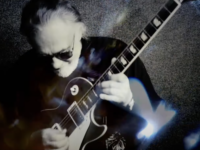Saxophonist Jacques Schwarz-Bart’s roots come from both Switzerland and Guadeloupe, but his debut album for ObliqSound was informed by much more, including music descending from Morocco as well as American jazz and funk. Perhaps the strongest gravitational point is Schwarz-Bart’s father, who passed away in 2006 and to whom this record is dedicated.
Far from being a downcast and somber tribute, Abyss celebrates his father’s spirit by bringing together all of these flavors to create an intense, upbeat, and focused experience. That’s a beautiful and deserving outcome for an album described as Kaddish for his father. And why not? Lives are to be feted, even if they have come to an end.
It’s for that reason that we should begin with the funk. The title track blisters with guest guitarist John Scofield laying down a wicked guitar solo, primary guitarist Herve Samb shadowing the leader’s sax lines, and percussionists Sonny Troupè Marke and Olivier Juste elevating everything with a pile of bubbling, interlocked grooves. Vocalist Elisabeth Kontomanou sets the joyous mood that soon overtakes all players involved. Mid-tune, Scofield takes an inspired solo backed by the occasional keyboard chord and the nonstop energy of Troupè and Juste. The tune ends with some nasty unison lines played by our leader, Scofield and Samb. Kontomanou comes back at the very end to cool things off just a litte.
Speaking of unison play, “Mende Chiraj” is one long exercise in it, with Schwarz-Bart’s lines flashing above bubbling percussion and Reggie Washington’s insistent bass.
There are bits of spoken word poetry here (that’s actually mother Simone on “Simone”), as well as pensive instrumentals (particularly, “Andre”), and explosions of energy; check out Schwarz-Bart’s sax solo during the opening “Ban Ga To.” Wicked.
Part of what gave Abyss such a unique (and energy-filled) sound was the lack of a ‘formal’ drummer. Troupè and Juste did a fine job of staying right in the pocket, nudging things forward slightly when it became necessary. The strength of this arrangement was subtle, because it added energy to situations that might otherwise have fallen into a traditional, staid role. “Dio Chayne” might devolve into smooth jazz if it was not for its pulsing, meshed groove.
Schwarz-Bart, when referring to his father’s passing, says “Facing my father’s passing was as massive as diving into the unknown and embracing it.” Many of us have been there and have wondered if the creativity would ever resurface. Clearly it did for Jacques Schwarz-Bart, and we’re all the better for it.
[amazon_enhanced asin=”B002QK00VQ” container=”” container_class=”” price=”All” background_color=”FFFFFF” link_color=”000000″ text_color=”0000FF” /]
- Why the Rolling Stones’ Harrowing ‘Gimme Shelter’ is Still Revealing New Depths - November 18, 2024
- How Talking Heads’ ‘Fear of Music’ Opened Up a World of Art and Sound - August 5, 2024
- How Deep Cuts Propelled Bruce Springsteen’s ‘Born in the U.S.A.’ - June 4, 2024




